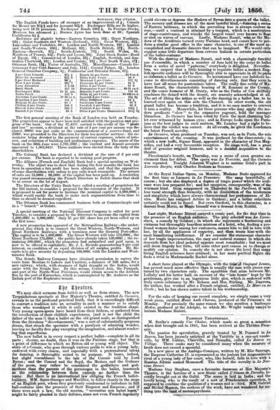4t Otatrts.
We may elicit sermons from ballets as well as from stones. The new Terpsichorean spectacle at Her Majesty's Theatre, entitled Le Corsaire, reveals to us the profound practical truth, that it is exceedingly difficult to convert a tradition into an actuality in such a manner as to satisfy those who worshiped it while it only existed in the tradition shape. Very young opera-goers have heard from their fathers, or gathered from the recollection of their childish experiences, and is not the child the father of the man ?) that a ballet on the old grand scale as distinguished from the frivolous divertissement," was a sort of substantially gorgeous dream, that struck the spectator with a paralysis of admiring wonder, leaving no faculty free play excepting the imagination, andalmost render- ing that superfluous. The new ballet is in every respect a perfect ballet—complete in all its parts ; shorter, no doubt, than it was on the Parisian stage, but that is a point of difference to which no Briton old or young will object. The story of a Corsair, who goes through various perils to win a young lady, endowed with every charm, and especially with a preternatural talent for dancing, is thoroughly suited to its purpose. It bears, indeed, but slight resemblance to the tale of the Corsair told by Lord Byron ; and the Conrad and the Seyd, the Medora and the Gulnare of the poem may rather be considered the godfathers and god- mothers than the parents of the personages in the ballet, inasmuch as the relationship between them extends no further than the name. But there is no international law obliging the French ballet- builders MM. Saint-Georges and Mazillier, to follow closely in the steps of an English poet, whom they graciously condescend to introduce in full ball-costume into the presence of their Emperor and Empress ; and if there were such a law, the old maxim, " neeessitas non habet
might be fairly pleaded in their defence, since not even French ingenuity
could elevate or depress the Medora of Byron into a queen of the ballet. The scenery and dresses are of the most tasteful kind,—forming a series of Eastern tableaux, in which the prevailing hue is always couleur de rose —until a contrast is attained by a tempest, which is a masterpiece of siagecontrivance, and wrecks the largest vessel ever known to float or sink on waves of canvass. Lastly, Madame Rosati, who as the Me- dora of the Academic turned every Parisian head, and conies here to per- form a similar good office in the same character, is one of the most ac- complished and dramatic dancers that can be imagined. We would only suggest some little departure from extreme fashion in certain particulate of the ballet-costume.
With the dancing of Madame Rosati, and with a charmingly fanciful pas d'ensemble, in which a number of fans held by the corps de ballet form a series of novel "patterns," everybody is delighted. Neverthe- less, we suspect that a little training is requisite before a modem Eng- lish operatic audience will be thoroughly able to appreciate in all its parts so elaborate a ballet as Le Corsairs. So accustomed have our habitues be- come to divertissements consisting of dancing only, that they seem to have lost all sense for pantomimic talent. The really fine acting of Ma- dame Rosati, the characteristic bearing of M. Ronzani as the Corsair, and the comic humour of M. Dauty, who as the Pasha of Cos skilfully combines the dotard with the despot, are scarcely acknowledged at all. The art of liking the action as well as the dancing in a ballet has to be learned over again on this aide the ChanneL In other words, the old grand ballet has become a tradition, and it is no easy matter to convert it into a reality. Meanwhile, let those persons who may apply the mo- dern predicate " slow " to the expansive pageant, hold the manager blameless. Le Corsairs has been voted by Paris the most charming bal- let ever witnessed by human eyes ; and as Europe looks upon the Paris- ians as the best judges in such matters Mr. Lumley had a right to be- lieve that the verdict was correct. At ;11 events, he gives the Londoners the latest French novelty. Is Corsairs, when produced on Tuesday, was not, as in Paris, the sole entertainment of the evening. It was prefaced by the Cenerentola ; in which a new buffo, Signor Rossi, appeared in the character of Don Mag- nifico, and haa a very. favourable reception. He sings well, has a great deal of genuine ongmal humour, and is a deeided acquisition to the theatre.
Piccolomini's benefit, on Thuraday, was a scene ot even greater ex- citement than her debut. The opera was La Traviata, and the Corsairs was repeated. Tonight Johtuma Wagner is to assume Grisrs part in Lucrezia _Borgia, with Charles Brahani as Gennaro.


























 Previous page
Previous page